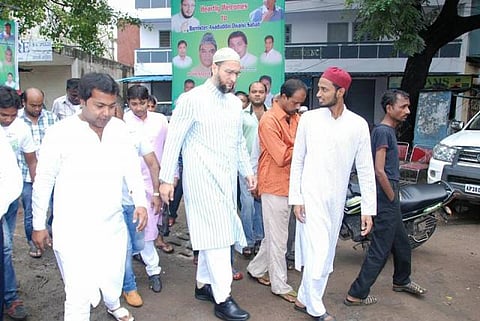

By Mohammed Shafeeq (IANS)
Majlis-e-Ittehadul Muslimeen (MIM) is gearing up to get a foothold in Bihar by contesting assembly elections in the Seemanchal region and is confident of making a modest but impressive debut. Confined to Hyderabad politics till recently, the party is making a serious attempt to cash in on its electoral gains in Maharashtra for a pan-India presence.
In a calculated move to contest from a region having sizable Muslim population, the party is testing the waters ahead of its bigger plans to make inroads in states like Uttar Pradesh and West Bengal.
Akhtarul Iman, the president of MIM's Bihar unit, is confident about the prospects.
"I have raised the flag keeping in view the winning chances. We will definitely win the seats which we are going to contest," Iman told IANS.
Muslims constitute 45 percent of over 10 million population of Seemanchal, a backward region comprising four districts and accounting for 24 seats in the 243-member assembly.
The party is looking to build on its electoral gains in Maharashtra, where it won two assembly seats out of 25 it contested in the last year's elections. It came second in two constituencies and third in eight.
Bihar will be the third state, where MIM is aiming to open its account in state legislature.
Besides one Lok Sabha seat (Hyderabad), seven assembly seats in the Telangana assembly, two in Maharashtra, the party also has considerable presence in urban local bodies in Telangana, Andhra Pradesh, Maharashtra and Karnataka.
Though the party failed to open its account in the Bengaluru municipal elections last month, party chief Asaduddin Owaisi promises this will not be repeated in Bihar.
He blamed the undemocratic attitude of the Congress government in Karnataka for the party's loss as he was not allowed to address meetings in Bengaluru.
The massive turnout at a rally addressed by Owaisi in Kishangunj on Seemanchal's backwardness last month makes the party believe that it has bright prospects in the region.
MIM looks to repeat its strategy in Maharashtra by bringing Muslims, Dalits and other backward classes on one platform as they together account for 70 to 75 percent of the population in Seemanchal.
"This is a long battle of the people of Seemanchal for their rights. They were eagerly waiting for a party which can take up the mantle and win this battle," said Iman, a former member of the Bihar assembly.
Aftab Alam, another leader of MIM in Bihar, disagreed that the MIM was a communal outfit.
"Any party with a Muslim leadership is branded as communal. This is hypocrisy of secular parties, which don't want to see Muslims as the leaders. They expect Muslims only to work under them," Alam, a former spokesman of the Congress party, told IANS.
"Even small social groups have formed their own parties to fight for their rights. Muslims are asking why can't they have their own party," he said.
By deciding to limit itself to Seemanchal, MIM has also tried to counter the criticism of Grand Alliance that its entry will benefit the BJP. "Seemanchal has just 24 seats. Let them defeat the BJP in other constituencies," said Owaisi.
Unfazed by the allegations that he is dividing secular votes to the advantage of the BJP, the 46-year-old barrister from London believes all have to carry the burden secularism.
"We are not coolies of secularism. This will not work now. We also have the capacity, capability and credibility to take on communal forces," he said.
With its aggressive expansion plans the 57-year-old party is trying to live to its complete name - All India Majlis-e-Ittehadul Muslimeen (AIMIM).
At public meetings, Owaisi recalls how their critics used to make fun of 'All India' in the party's name.
"People used to ask where is the party's office. Today I can tell them that the biggest party office in the country belongs to MIM," he said at meetings.
Established in 1928 with the aim to keep then Hyderabad State independent, the MIM was banned after the state's merger with the Indian Union in 1948.
However, in 1958 it was revived with a new constitution by Moulvi Abdul Wahid Owaisi, grandfather of Asaduddin Owaisi, to champion the cause of Muslims.